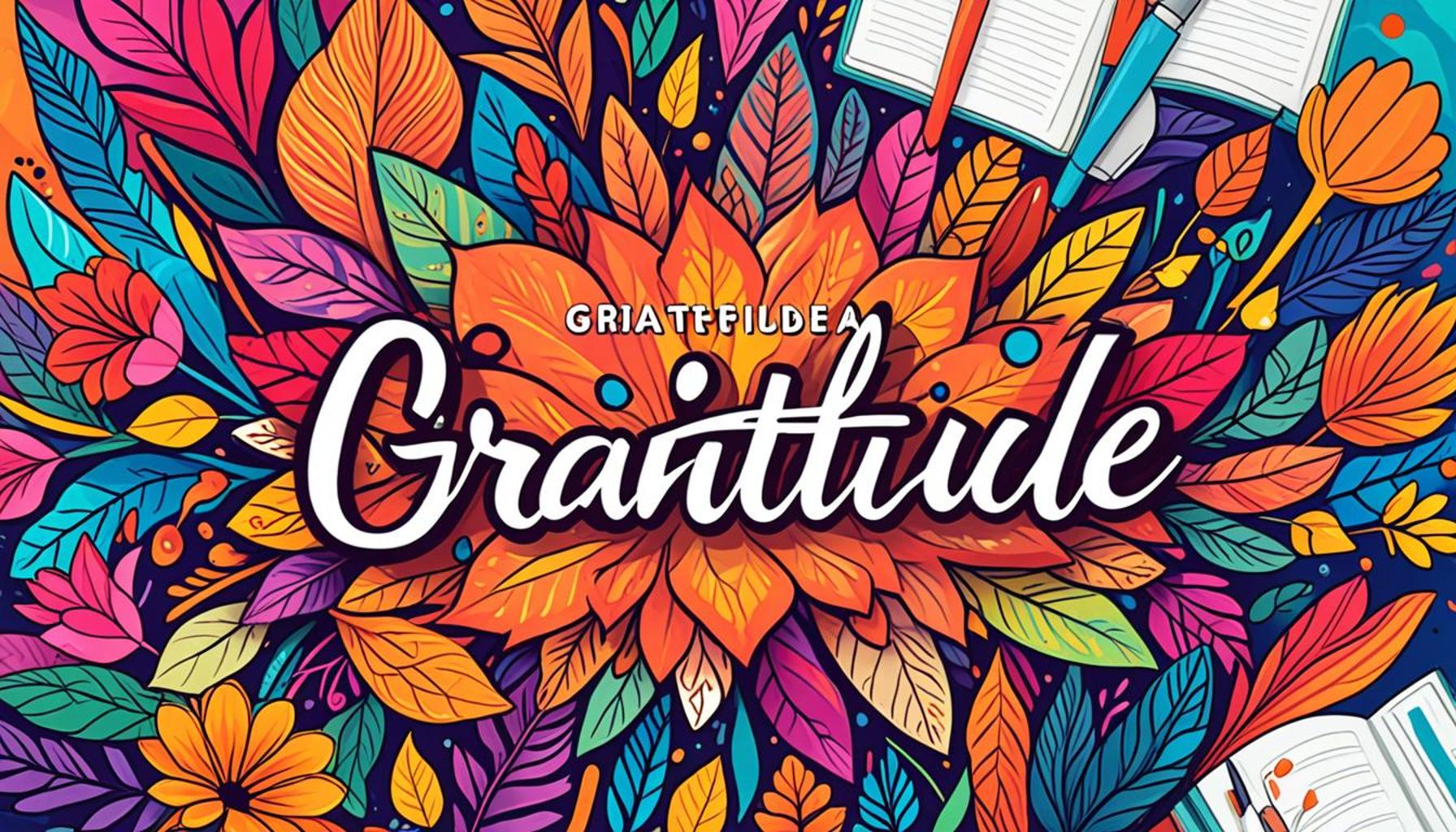Gratitude and Mindfulness: Practicing Awareness Through Thankfulness

Exploring the Synergy Between Gratitude and Mindfulness
In today’s fast-paced world, where distractions are abundant and life’s pressures can often feel overwhelming, the practice of gratitude and mindfulness emerges as a beacon of hope, guiding individuals back to their roots. The act of being thankful transcends mere verbal expressions; it is a profound recognition of the small yet significant joys that life offers us every day. By understanding the connection between these two concepts, one can embark on a journey of profound personal development and fulfillment.
Across Nigeria, expressions of gratitude are woven into the fabric of daily life. Various traditions and practices reflect this deep-seated appreciation. For instance, during communal prayers, it is common for individuals and families to offer thanks, acknowledging not just the larger blessings but also the everyday miracles, like the warmth of the sun, the company of loved ones, or even the bounty of a shared meal. Furthermore, Nigerians frequently express appreciation to family and friends, often taking time to acknowledge the support they provide in challenging times. This culture of gratitude extends to the community level, where acts of kindness, such as helping a neighbor with their chores or participating in community service, reinforce bonds and foster a spirit of togetherness.
Mindfulness plays a crucial role in enhancing these expressions of gratitude. It involves being fully present and engaged in the moment, allowing individuals to appreciate life’s intricacies more deeply. When gratitude is practiced alongside mindfulness, our daily experiences can be transformed from mundane routines into treasured moments of joy. This harmonious blend encourages:
- A deeper recognition of life’s nuances, prompting individuals to notice the beauty in simple things, like the laughter of children playing or the color of the sky during sunset.
- A shift in focus from what is lacking to what is abundant, enabling people to see the wealth of resources, relationships, and opportunities available to them.
- Improved emotional well-being and resilience, as a grateful mindset can alleviate feelings of anxiety and foster a more hopeful outlook on life.
By embracing awareness through thankfulness, individuals not only sharpen their mental clarity but also nurture a more positive and fulfilling perspective on their lives. The ripple effect of this practice can significantly enrich both personal lives and the broader community dynamics, forging stronger communal ties and enhancing overall social cohesion. This article aims to illuminate the transformative power of gratitude and mindfulness, inviting readers to explore practical tips and insightful reflections that can cultivate these invaluable practices in their daily lives.
YOU MAY ALSO LIKE: Read read another article

Benefits of Integrating Gratitude and Mindfulness
As individuals navigate the complexities of modern life, integrating gratitude and mindfulness can offer a range of psychological and emotional benefits that contribute to overall well-being. The two practices are not merely complementary; they can create a powerful synergy that enhances one’s quality of life by fostering a deeper connection to our experiences.
Research has increasingly highlighted the benefits of cultivating a grateful mindset. According to a study published in the Journal of Personality and Social Psychology, individuals who regularly practiced gratitude reported higher levels of happiness and satisfaction in their lives. This is particularly relevant for Nigerians, as community and familial ties are paramount. When individuals take time to appreciate their surroundings and show gratitude for their blessings, they not only enhance their own emotional states but also uplift those around them.
On the other hand, mindfulness—the act of being present and fully engaged with the current moment—allows individuals to become more aware of their thoughts, feelings, and bodily sensations. This awareness can lead to a more compassionate understanding of oneself and others. A notable benefit of mindfulness is its ability to reduce stress and anxiety. By observing their thoughts without judgment, individuals become better equipped to handle life’s ups and downs. This practice aligns closely with the concept of gratitude as it requires individuals to focus on the positive aspects of their lives.
Combining mindfulness with gratitude can yield a range of transformative benefits:
- Increased Emotional Resilience: When individuals practice gratitude mindfully, they bolster emotional resilience. Instead of becoming overwhelmed by negative emotions, they develop healthier coping strategies.
- Enhanced Sense of Community: In a country like Nigeria, where communal living is essential, practicing gratitude fosters a stronger sense of belonging and connectedness. Individuals who express gratitude build stronger relationships with friends, family, and even strangers.
- Heightened Awareness of Life’s Blessings: When one approaches each moment with mindfulness, they naturally begin to notice the abundance around them, whether it’s the rich flavors of a traditional meal shared with loved ones or the serenity found in nature.
The essence of these practices lies in their cumulative effect on promoting a positive outlook. By incorporating gratitude into mindful moments, individuals can significantly enhance their appreciation for life. The practice of gratitude not only helps in recognizing the gifts in our daily lives but also deepens one’s connection to all that surrounds them. As mindfulness steers us toward present-awareness, gratitude opens our eyes to the richness of our experiences. Embracing this intersection can ultimately set the stage for a more fulfilling life, characterized by joy and connectedness.
| Advantages | Description |
|---|---|
| Enhanced Well-being | Practicing gratitude can significantly improve both mental and physical health, promoting a sense of happiness and contentment. |
| Stronger Relationships | A focus on thankfulness helps nurture connections with others, enhancing empathy and trust, ultimately leading to deeper interpersonal relationships. |
Integrating the principles of gratitude and mindfulness into our daily lives can lead to profound changes in how we perceive stress and negativity. Research indicates that individuals who regularly express gratitude often experience less anxiety and depression. This practice cultivates a mindset where challenges are viewed as opportunities, thus fostering resilience.Moreover, the simple act of recognizing the positive aspects of life can enhance our awareness of the present moment. Mindfulness, paired with thankfulness, encourages individuals to step back and appreciate the small joys often overlooked—be it a vibrant sunset or a warm cup of tea. This habit not only enriches personal experiences but also promotes an overall sense of fulfillment.Embracing gratitude can also enhance our creativity and productivity. By shifting focus from what is lacking to what is abundant, we unlock mental blocks and open ourselves to new possibilities. When we practice awareness through thankfulness, we pave the way for a life filled with purpose and intention, inviting opportunities for growth and exploration.Thus, the synergy of gratitude and mindfulness not only uplifts our spirits but also empowers us to live more enriched lives. The journey towards awareness through thankfulness is a gradual yet rewarding path, encouraging us to delve deeper into the significance of every experience.
YOU MAY ALSO LIKE: Read read another article
Ways to Cultivate Gratitude and Mindfulness in Daily Life
To reap the rich rewards of gratitude and mindfulness, it is essential to develop practical habits that integrate these concepts into everyday life. In Nigeria, where vibrant communities and rich traditions offer a plethora of connections, seizing these opportunities can lead to a profound transformation in one’s perspective. Here are several effective strategies to cultivate these practices:
- Gratitude Journaling: One of the simplest yet most powerful tools for fostering gratitude is keeping a journal. Set aside a few moments each day to write down three things for which you are grateful. This practice encourages reflection on the positives in life, be it the warmth of a colleague’s smile or the taste of a favorite dish enjoyed with family.
- Mindful Eating: In Nigeria, meals are often communal experiences laden with cultural significance. Use mealtimes as an opportunity for mindfulness. Savor each bite, focusing on the flavors and textures, and cultivate gratitude for the sustenance you are receiving. This act can result in a deeper appreciation for food and the relationships that surround it.
- Expressing Gratitude Verbally: Take the time to express gratitude openly with family, friends, and colleagues. A simple “thank you” or acknowledgment of someone’s effort can forge stronger connections and create a ripple effect of positivity. This practice highlights the importance of community within Nigerian culture and encourages a safe environment for expression.
- Nature Walks and Reflection: Nigeria’s landscapes, from its bustling cities to serene parks, offer ideal settings for practicing mindfulness. Engage in regular walks in nature, focusing on the sounds, sights, and sensations around you. Use this time to reflect on what you are thankful for, integrating both gratitude and mindfulness in a calming practice.
The act of recognizing and appreciating the little things can help alleviate feelings of stress and anxiety, a significant concern in the fast-paced urban life prevalent in cities like Lagos and Abuja. Incorporating mindful gratitude can create valuable moments of pause in daily routines.
Cultivating a Grateful Mindset in Challenging Times
Life is replete with challenges, and for many Nigerians, circumstances such as economic struggles or personal losses can weigh heavily. However, embracing a grateful mindset can serve as a lifeline. Research from the Greater Good Science Center suggests that gratitude practices can shift our perspectives even in difficult situations, allowing us to focus on what we can learn and appreciate, rather than solely on what we lack.
In times of hardship, celebrate the small victories—whether it’s securing a job interview or the support of a loved one. By recognizing these aspects, individuals not only cultivate gratitude but also enhance their resilience in the face of adversity. The process transforms challenges into stepping stones for growth.
Moreover, integrating community-driven gratitudinal practices, such as coming together for thankfulness events during festive seasons or recognizing acts of kindness regularly, can reinforce communal bonds. This alignment of mindfulness and gratitude not only uplifts the spirit but fosters an atmosphere of mutual support and belonging, which is vital in a country where community plays such a pivotal role.
By intentionally weaving gratitude and mindfulness into daily routines, individuals can discover a potent blend that enriches their lives and nurtures their well-being, making every moment a nuanced tapestry of appreciation and awareness.
YOU MAY ALSO LIKE: Read read another article
Final Thoughts on Gratitude and Mindfulness
In a world that often emphasizes the rush of daily life, practicing gratitude and mindfulness offers a sanctuary where individuals can reconnect with the present moment and foster a deeper appreciation for life’s offerings. By integrating these practices into our routines, especially within the rich tapestry of Nigerian culture, we can transform our outlook and cultivate a more resilient and positive mindset.
Engaging in simple, thoughtful habits—whether through grateful reflections, celebrating communal meals, or embracing the beauty of nature—empowers us to slow down and cherish the little joys that surround us. In times of hardship, these practices become even more crucial, as they enable us to navigate challenges with grace and optimism, revealing valuable lessons hidden beneath obstacles.
Moreover, as we nurture a culture of thankfulness in our communities, we strengthen the bonds that unite us and foster an environment where positivity can flourish. The ripple effect of expressing gratitude doesn’t just elevate individual spirits; it enhances the collective well-being of our communities, making it essential in our shared human experience.
Ultimately, adopting a lifestyle anchored in gratitude and mindfulness is not merely a choice but a transformational journey that enables us to navigate life’s complexities with greater awareness and compassion. As we cultivate this practice, we illuminate our paths with appreciation and intention, enriching not only our lives but also the lives of those around us.


